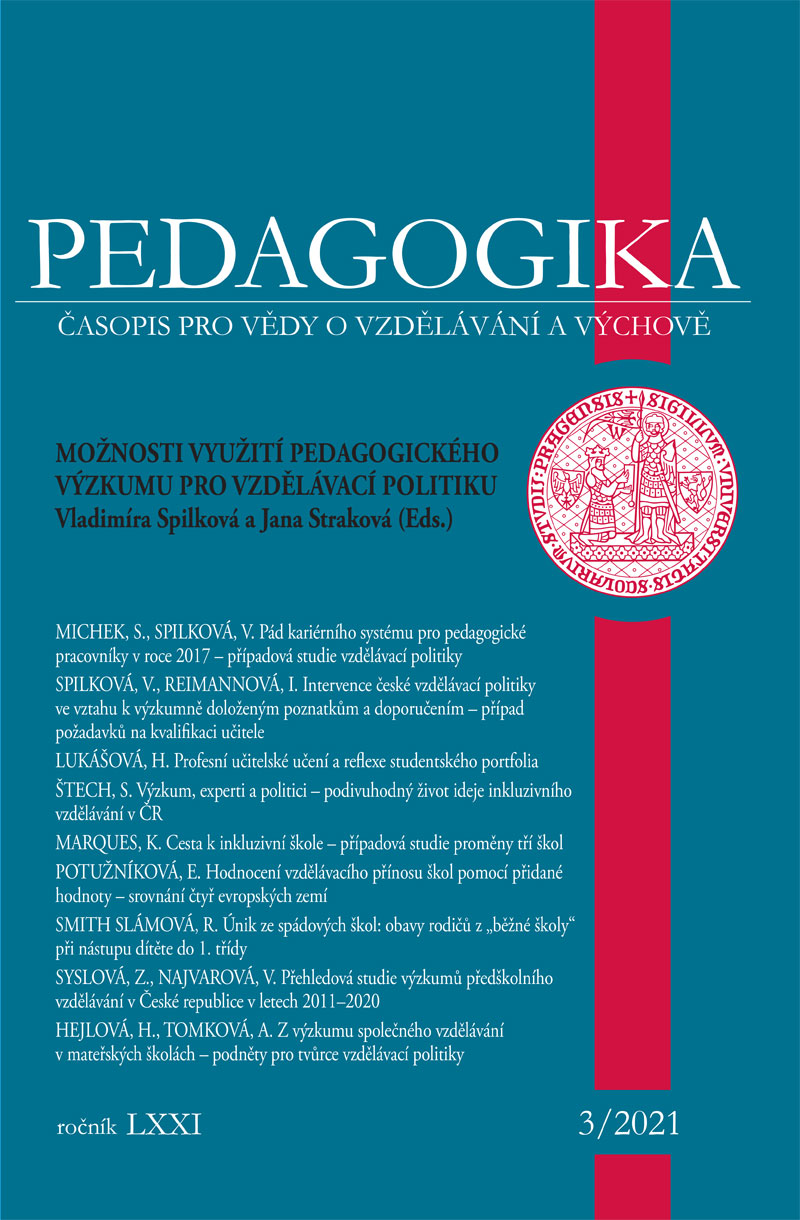Interventions of Czech Educational Policy Compared to Research-Based Findings and Recommendations: The Case of Teaching Qualification Requirements
DOI:
https://doi.org/10.14712/23362189.2021.986Keywords:
educational policy, evidence-based approach, qualification requirements, research of the teaching profession, de-professionalisation of teaching, de-qualification amendment, de-professionalisation amendmentAbstract
The aim of the study is to analyse the approach of Czech educational policy to the qualification requirements for entry into the teaching profession, related to the currently discussed amendment to Act 563/2004 Coll., on educational staff and its controversial § 9a. The investigation of the legislative definition of teaching qualification requirements in this amendment and the process of its debate aims at gaining comprehension and a deeper understanding of the relationship between political decision making and research-based findings and the way they are communicated to politicians.
The main research questions are: (1) What reasons for the reduction of qualification requirements in the de-professionalisation amendment were formulated by the submitter of the amendment – the Ministry of Education, Youth and Sports and deputies and senators of the Parliament of the Czech Republic? (2) What arguments did politicians – both supporters and opponents of the amendment – present in their statements during the legislative process? (3) What opinions did other actors from the professional and general public express during the amendment debate?
The questions related to the case of the de-professionalisation and de-qualification amendment are followed by more general research questions: (1) How does Czech educational policy approach teaching as a regulated profession with certain occupational roles, the performance of which is regulated and limited? (2) How are research findings and research-based recommendations from the European and national levels used in Czech educational policy and in decision-making processes in the field of the teaching profession?
The study is based on the desk research methodology. Key data sources are: legislation (different versions of the amendment – deputies’ and senators’ copies of the amendment, amendatory proposals, stenographic records of meetings of both chambers of the Czech Parliament), professional and strategic documents (at the national and European levels), documents of the Ministry of Education, Youth and Sports, statements made by other important actors and press releases (professional associations, experts, non-profit organisations, posts on social networks – www.pedagogicka-komora.cz), and email communication between one of the authors of the article with parliamentary deputies and senators.
The discussion of the results reflects critically on the content and ways of justifying the devaluation of teaching qualification requirements expressed by politicians. The relevance and appropriateness of the main reasons presented by the submitter of the amendment – the Ministry of Education, Youth and Sports – and other key legislative actors are evaluated. Furthermore, the extent of the relevant research data and recommendations used in the process of creating the amendment and political decision making in the legal requirements concerning teaching qualifications is assessed.
References
Barber, M., & Mourshed, M. (2007). How the world's best-performing schools come out on top. London: McKinsey.
Crone, L. J., & Teddlie, C. (1995). Further examination of teacher behavior in differentially effective schools: Selection and socialization process. Journal of Classroom Interaction, 30(1), 1-12.
Darling-Hammond, L. (2000). Teacher quality and student achievement: A review of state policy evidence. Education Policy Analysis Archives, 8(1).
https://doi.org/10.14507/epaa.v8n1.2000
European Commission/EACEA/Eurydice (2018). Teaching careers in Europe: Access, progression and support. Eurydice report. Luxembourg: Publications Office of the European Union.
European Commission/EACEA/Eurydice (2021). Teachers in Europe: Careers, development and well-being. Eurydice report. Luxembourg: Publications Office of the European Union.
Hanusek, A. E., Kain, F .J., & Rivkin, G. S. (2005). Teachers, schools, and academic achievement. Econometrica, 73(2), 417-458.
https://doi.org/10.1111/j.1468-0262.2005.00584.x
Hanušová, S. et al. (2017). Chtějí zůstat nebo odejít? Začínající učitelé v českých základních školách. Brno: Pedagogická fakulta MU.
https://doi.org/10.5817/CZ.MUNI.M210-8922-2017
Hattie, J. (2009) Teachers make a difference. What is the research evidence? Australian Council for Educational Research. Dostupné z www.det.nsw.edu.au/proflearn/docs/pdf/qt_hattie.pdf
Kol. autorů (2021). Nedostatek kvalifikovaných učitelů nelze řešit rezignací na kvalifikaci. Pedagogika, 71(1), 120-125.
https://doi.org/10.14712/23362189.2020.1912
Kotásek, J. et al. (1991). Rozvaha o školství a vzdělanosti a jejich dalším vývoji v českých zemích. Praha: Pedagogická fakulta UK.
Koucký, J. (2021). Učitelů možná není vůbec málo. (Online). Dostupné z https://vzdelavani21.cz/V21-21.html?news=12163&locale=cz
Koucký, J. (2020). Důvody nedostatku učitelů. Úvodní studie z projektu. Dostupné z https://pages.pedf.cuni.cz/nedostatekucitelu/author/24625498/
Maňák, J. (1995). Hlavní otázky profesionální přípravy učitelů. In Teorie v pedagogické praxi, praxe v pedagogické teorii v učitelském studiu (s. 24-27). Brno: Paido.
Spilková, V. (2016). Přístupy české vzdělávací politiky po roce 1989: Deprofesionalizace učitelství a učitelského vzdělávání? Pedagogika, 66(4), 368-385.
https://doi.org/10.14712/23362189.2016.348
Spilková, V. et al. (2004). Současné proměny vzdělávání učitelů. Brno: Paido.
Spilková, V., & Wildová, R. (2014). Potřebujeme kvalitní, nebo kvalifikované učitele? Pedagogická orientace, 24(3), 423-432.
https://doi.org/10.5817/PedOr2014-3-423
Štech, S. (2020). Trápení s užitečností pedagogického výzkumu: Jen ztraceni v překladu? Pedagogika, 70(1), 109-117.
https://doi.org/10.14712/23362189.2020.1638
Štech, S. (2021). Reakční novela zákona o pedagogických pracovnících. Deník Referendum. (Online). Dostupné z https://denikreferendum.cz/clanek/32201-reakcni-novela-zakona-o-pedagogickych-pracovnicich
Urbánek, P. (2005). Vybrané problémy učitelské profese. Aktuální analýza. Technická univerzita v Liberci.
Urbánek, P. (2013). Vzdělávání učitelů v České republice (po Česku): Riziko deprofesionalizace. In J. Ferencová & I. Ištván (Eds.), Križovatky na cestách k učiteľstvu. Prešov: FHPV PU a Škola plus.
Veselý, A., Kohoutek, J., & Špačková, Z. (2015). Vzdělávací politika. Brno: Ekonomicko-správní fakulta MU.
Vítečková, M. (2018). Začínající učitel: jeho potřeby a uvádění do praxe. Brno: Paido.
Walterová, E. (1993). Výzkum v komparativní a mezinárodní pedagogice a jeho funkce v transformaci vzdělávání. Pedagogika, 43(4), 379-384.
Walterová, E. (2006). Srovnávací pedagogika. Vývoj a proměny v globálním kontextu. Praha: Pedagogická fakulta UK
Weiss, C. H. (1979). The many meanings of research utilization. Public Administration Review, 39(5), 426-431.
https://doi.org/10.2307/3109916
Zákon č. 197/2014 Sb., kterým se mění zákon č. 563/2004 Sb., o pedagogických pracovnících a o změně některých zákonů, ve znění pozdějších předpisů.
Závěrečná zpráva NERV (2011). Závěrečná zpráva podskupin Národní ekonomické rady vlády pro konkurenceschopnost a podporu podnikání. Kapitola III. Vzdělanost. (Online). Dostupné z www.vlada.cz/assets/media-centrum/aktualne/NERV_kap03.pdf



